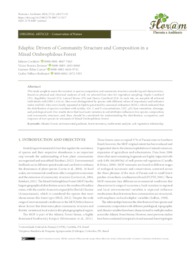Edaphic drivers of community structure and composition in a Mixed Ombrophilous Forest.
Edaphic drivers of community structure and composition in a Mixed Ombrophilous Forest.
Author(s): CORDEIRO, J.; ZWIENER, V. P.; CURCIO, G. R.; RODERJAN, C. V.
Summary: This study sought to assess the variation in species composition and community structure considering soil characteristics. Based on physical and chemical analyses of soil, we selected four sites for vegetation sampling: Haplic Cambisol (P1), Regolithic Neosol (P2), Latosol Bruno (P3) and Humic Cambisol (P4). In each site, we sampled all arboreal individuals with DBH 4.8 cm. Sites were distinguished by species with different values of importance and indicator index (indVal). Sites were clearly separated in biplots generated by canonical ordination (RDA), which indicated that the distribution of species correlates with acidity, Al+, C and P concentrations, CEC, pH, base saturation, drainage, and pedological unit. Our results show that local scale variation in soil attributes influences tree species composition and community structure, and, thus, should be considered for understanding the distribution, occupation, and response of tree species in remnants of Mixed Ombrophilous Forest.
Publication year: 2020
Types of publication: Journal article
Unit: Embrapa Forestry
Observation
Some of Embrapa's publications are published as ePub files. To read them, use or download one of the following free software options to your computer or mobile device. Android: Google Play Books; IOS: iBooks; Windows and Linux: Calibre.
Access other publications
Access the Agricultural Research Database (BDPA) to consult Embrapa's full library collection and records.
Visit Embrapa Bookstore to purchase books and other publications sold by Embrapa.

